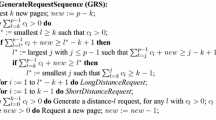Abstract
The classical online paging problem mathematically abstracts memory management systems.
Early worst-case results for paging algorithms leave a significant gap to practical experience: Many “reasonable” algorithms, such as Least Recently Used, are empirically superior to “intuitively inferior” ones, like First-In First-Out or Flush When Full. But they have identical theoretical worst-case performance guarantees. Moreover, these guarantees do not adequately reflect empirical evidence.
To overcome this unsatisfying situation, many adversarial models intended to reflect the “typical” situation have been proposed. This article surveys the most prominent of them.
Similar content being viewed by others
References
Achlioptas D, Chrobak M, Noga J (2000) Competitive analysis for randomized paging algorithms. Theor Comput Sci 234:203–218
Albers S, Favrholdt LM, Giel O (2002) On paging with locality of reference. In: Proceedings of the 34th annual ACM symposium on theory of computing (STOC ’02), pp 258–267
Becchetti L (2004) Modeling locality: a probabilistic analysis of LRU and FWF. In: Proceedings of the 12th annual European symposium on algorithms (ESA ’04), pp 98–109
Belady LA (1966) A study of replacement algorithms for virtual storage computers. IBM Syst J 5:78–101
Borodin A, El-Yaniv R (1998) Online computation and competitive analysis. Cambridge University Press, Cambridge
Borodin A, Irani S, Raghavan P, Schieber B (1995) Competitive paging with locality of reference. J Comput Syst Sci 50(2):244–258
Chrobak M, Noga J (1999) LRU is better than FIFO. Algorithmica 23:180–185
Coffman EG Jr, Denning PJ (1973) Operating systems theory. Prentice-Hall, New York
Denning PJ (1968) The working set model for program behavior. Commun ACM 11(5):323–333
Denning PJ (1980) Working sets past and present. IEEE Trans Softw Eng 6:64–84
Fiat A, Mendel M (1997) Truly online paging with locality of reference. In: Proceedings of the 38th annual symposium on foundations of computer science (FOCS ’97), pp 326–335
Fiat A, Rosen Z (1997) Experimental studies of access graph based heuristics: beating the LRU standard? In: Proceedings of the 8th ACM-SIAM symposium on discrete algorithms (SODA ’97), pp 63–72
Fiat A, Karp RM, Luby M, McGeoch LA, Sleator DD, Young NE (1991) Competitive paging algorithms. J Algorithms 12(4):685–699
Franaszek PA, Wagner TJ (1974) Some distribution-free aspects of paging performance. J ACM 21:31–39
Irani S, Karlin AR, Phillips S (1996) Strongly competitive algorithms for paging with locality of reference. SIAM J Comput 25(3):477–497
Karlin AR, Phillips SJ, Raghavan P (1992) Markov paging. In: Proceedings of the 33rd annual symposium on foundations of computer science (FOCS ’92), pp 208–217
Koutsoupias E, Papadimitriou CH (2000) Beyond competitive analysis. SIAM J Comput 30(1):300–317
McGeoch LA, Sleator DD (1991) A strongly competitive randomized algorithm. Algorithmica 6(1–6):816–825
Panagiotou K, Souza A (2006) On adequate performance measures for paging. In: Proceedings of the 38th annual ACM symposium on theory of computing (STOC ’06)
Sites RL, Agarwal A (1988) Multiprocessor cache analysis using ATUM. In: 15th IEEE international symposium on computer architecture, pp 186–195
Sleator DD, Tarjan RE (1985) Amortized efficiency of list update and paging rules. Commun ACM 28(2):202–208
SPEC—Standard Performance Evaluation Corporation. www.spec.org
Torng E (1998) A unified analysis of paging and caching. Algorithmica 20:175–200
von Neumann J, Morgenstern O (1944) Theory of games and economic bahaviour. Princeton University Press, Princeton
Young N (1991) On-line caching as cache size varies. In: Proceedings of the 2nd ACM-SIAM symposium on discrete algorithms (SODA ’91), pp 241–250
Young NE (2000) On-line paging against adversarially biased random inputs. J Algorithms 37(1):218–235
Author information
Authors and Affiliations
Corresponding author
Rights and permissions
About this article
Cite this article
Souza, A. Adversarial models in paging. Comput Sci Res Dev 27, 197–205 (2012). https://doi.org/10.1007/s00450-011-0152-6
Published:
Issue Date:
DOI: https://doi.org/10.1007/s00450-011-0152-6




